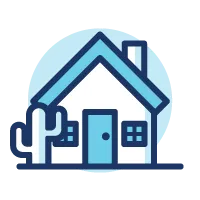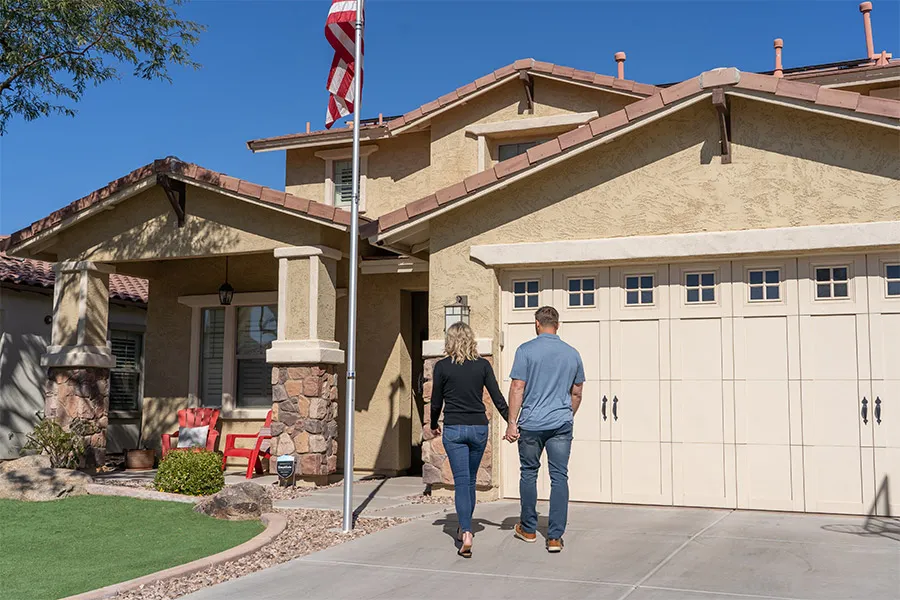What We'll Cover
- How to determine your house budget
- The average home sale prices in different parts of the state
- How your down payment affects your monthly mortgage payment (with examples!)
For both investors and first-time home buyers, Arizona may be one of the most sought-after states to buy a house in today.
In fact, Arizona ranks number 5 in the nation as the most moved-into state from July 2021 to July 2022. Arizona’s largest city, Phoenix, is also inside the top 10 most moved-into major cities across the United States, coming in at number six.
Plus, the Arizona housing market is becoming less competitive, which is good news for buyers.
Redfin reports that homes selling for over the asking price in Arizona fell 36% year-over-year while the average amount of days on the market have more than doubled from 21 days to 58 days (March 2023). This translates to buyers having more control in the home-buying process than you would otherwise see in a typical seller’s market.
Are you ready to buy a house in Arizona? Let’s look at what you need to know to be ready, how to determine where to live, and what the process is like for buying a house.
How to Buy a House in Arizona
While the process of buying a house in Arizona is similar to buying a house anywhere else in the country, there are a few details that are unique to the Grand Canyon State.
Here are the 10 steps to follow for whether you’re purchasing your primary residence or an investment property in Arizona today.
Step 1: Determine If You’re Ready to Buy a House in Arizona
With the median home sale price in Arizona of $420,300, you first need to make sure you’re financially ready to make one of the largest financial decisions in your lifetime. One thing about becoming a homeowner is that you are responsible for everything when it comes to the home.
This means making sure you have a fully funded emergency fund of between three and six months’ worth of expenses. When the hot water heater goes out, the roof starts leaking, and the A/C unit needs repair – you’ll be thankful you built up your emergency fund before buying your home.
It’s also a great plan to pay down all debt before purchasing a home. Paying off your current debt amount lowers your debt-to-income ratio, thus increasing your credit score and giving you access to a more favorable loan rate. Debt also comes with monthly debt payments, making life more difficult when you add a mortgage on top.
With a fully funded emergency fund in place and no monthly debt payments, you’re in the perfect position to buy a home.
Step 2: Determine How Much House You Can Afford
A good rule of thumb is to make sure your mortgage is no more than 30% of your monthly take-home pay. This means if you’re taking home $5,000 per month, then you want to keep your mortgage payment at $1,500 or less.
When you go beyond that 30% threshold, the ability to do everything else you’ll want to do with money becomes much more difficult. For example, saving up for big purchases, investing for retirement, and still having enough money leftover to enjoy life is possible at 30% or less of your take-home pay.
One of the biggest mistakes first-time home buyers make is getting a loan for what they were approved for instead of what they can actually afford. Instead, take a look at your current monthly budget and then determine what 30% of your monthly take-home pay would feel like alongside your current monthly expenses.
Determine how much is left over each month to put into savings, build for retirement, and still pay for all of life’s other expenses. When doing this process, you’ll see why it’s so important to get rid of your debt prior to buying a home.
Step 3: Determine Where to Buy a House in Arizona
Now that you’ve determined how much house you can afford, it’s time to choose where you want to buy a house in Arizona.
While the average home sale price for the entire state of Arizona is just over $420,000, each city will fluctuate based on the location, the current demand, and the overall housing market for that city.
| Average Home Sale Price by City in Arizona | |
|---|---|
| Phoenix | $410,000 |
| Flagstaff | $519,000 |
| Chandler | $513,000 |
| Tucson | $329,950 |
| Gilbert | $540,000 |
| Yuma | $336,000 |
| Tempe | $415,000 |
| Prescott | $600,000 |
| Glendale | $390,000 |
| Kingman | $295,000 |
Source: Redfin, as of November 30th, 2022
Beyond the average home sale price, you’ll also want to consider the following:
- Cost of living
- Job opportunities
- Schools and school districts
- Property taxes
- Crime statistics
- Nearby amenities
Step 4: Save Up for a Big Down Payment
Saving up for a big down payment may be one of the most important pieces to purchasing a home.
Pro Tip: The larger the down payment, the more money you will save over the life of the loan.
Let’s take a look at a few different mortgage options using a $410,000 home in Phoenix, Arizona.
Example #1: FHA Loan on $410,000 sale price
**Using 6.5% interest rate on a 30-year term
Example #2: Conventional Loan (10% Down) on $410,000 sale price
**Using 6.5% interest rate on a 30-year term
Example #3: Conventional Loan (20% Down) on $410,000 sale price
**Using 6.5% interest rate on a 30-year term
As you can see from the examples above, saving up for a bigger down payment can save you a lot of money. Using the average sale price in Phoenix, Arizona on a 30-year fixed rate mortgage can be the difference of over $130,000 in savings when you make a higher down payment!
Mortgage Insurance Premium and Private Mortgage Insurance
When you go with a down payment of less than 20%, you’ll be required to pay either a mortgage insurance premium (MIP) for FHA loans or private mortgage insurance (PMI) for conventional loans.
FHA loans require a monthly mortgage insurance premium for the life of the loan when the borrower puts less than 10% down. However, when the borrower comes in with 10% down for a FHA loan, the mortgage insurance premium will cancel at 11 years.
For conventional loans, anything less than 20% down will require private mortgage insurance and the private mortgage insurance will cancel when the loan-to-value reaches 80%.
It’s important to note that this only applies for borrower-paid private mortgage insurance. If the lender pays for the private mortgage insurance, then it cannot be canceled and will last for the life of the loan.
VA Loans
If you are an active-duty service member, a veteran, or in some cases a surviving family member, you can buy a home in Arizona using a VA loan with zero money down and no private mortgage insurance.
**Using 6.5% interest rate on a 30-year term
Step 5: Pre-Qualify for a Mortgage
The next step to buying a home in Arizona is pre-qualifying. Prequalification is a quick snapshot of what you may be able to receive for financing. It’s a good first step in your homebuying journey and can be done with a very basic online application or following a quick conversation with your lender.
Make sure you have basic information like your income, assets and debt so that your lender can make an assessment about whether you’d qualify for a loan.
While prequalification is the most informal step in the homebuying process it can be a confidence builder. Once you’re pre-qualified, you’ll have an idea about which home loan options fit your needs and goals. If you’ve been asking whether to go with a 30-year fixed-rate loan or an adjustable rate mortgage, a prequalification may give you a better idea of which option is best for you.
Choosing the Best Lender
If you’re looking for the best lender for your future mortgage, it’s helpful to go with a lender who knows the state of Arizona and is within the community you’re purchasing.
You’ll find better rates when you choose to go with a local credit union. Unlike banks that are owned by investors, credit unions are owned by the members they exist to serve.
This means instead of generating profits for investors, credit unions can pass the savings back onto the member in the form of lower fees, lower loan rates and higher deposit rates.
Step 6: Find the Best Real Estate Agent
When it comes to hiring the person to help you make the biggest financial decision in your lifetime, you don’t want to hire a real estate agent who’s winging it. Instead, look for a seasoned professional who knows the ins and outs of the Arizona real estate market.
Pro Tip: It’s beneficial to interview at least three real estate agents. These can be referrals from friends and family, any research you’ve done on your own, or even agents you’ve met at open houses.
Be cautious about choosing a real estate agent who is also a family member or close friend. Keep in mind they will be asking for personal information that you may not be comfortable with them knowing (such as how much money you make). Plus, even a good real estate agent can make mistakes. You don’t want that kind of tension with someone close to you.
When interviewing real estate agents, ask them the following questions:
- How long have you been a full-time real estate agent in Arizona?
- How many homes do you close on per year? (Preferably 35 or more)
- What sets you apart from other real estate agents in the area I’m looking in?
- Will I be required to sign a contract with you, and can I cancel without penalty?
- Do you have a list of past clients I could contact?
Step 7: Start Searching For Your Home
Once you’ve been pre-qualified and have hired your real estate agent, the search for your Arizona home begins.
Start off by giving your real estate agent the home price you can afford. Remember, this is the amount of home that will allow you to make a monthly mortgage payment that is 30% or less of your monthly take-home pay.
Next, give your agent a list of needs and wants. This includes the area you’re interested in, size of the home, number of bedrooms, layout of the home, and any other information to help your agent narrow down the home search for you.
Many real estate experts will advise you to look for the least expensive home in the best neighborhood you can afford. This gives your home’s value room to grow by allowing the value of other homes in your neighborhood to bring the value of your home up.
Step 8: Submit an Offer
Once you find the home you’ve been dreaming of, it’s time to submit an offer. If you’ve been following the steps in order, then you’re in a great position to submit an offer: you have a large down payment, you’ve already been pre-approved, and you’ve hired the best real estate agent to help you with your offer.
In a highly sought-out real estate market such as Arizona, most sellers will require the buyer to put down earnest money – a good faith deposit to demonstrate to sellers your seriousness in buying their home.
Earnest money is typically in the range of 1% - 2% of the purchase price and is most often structured as a non-refundable deposit if you were to cancel the contract without a valid reason. This protects the seller from buyers who may not be as serious as they lead on and also helps buyers win an offer in a competitive market.
Lastly, work with your real estate agent to determine a closing date and any contingencies they believe would be helpful for you during the closing process.
Step 9: Get a Home Inspection and an Appraisal
After you’ve made your offer, you'll need to get a home inspection and appraisal done. As a buyer, you have the right to a professional inspection before you buy the house. This will protect you if there are things the seller didn’t disclose during the sale of the home.
Mortgage lenders require a home appraisal in Arizona because it plays a role in how much they are able to lend to you. Typically a lender will not loan out more than the appraised value of the home.
Step 10: Close On Your House
Finally, it's time to close on your house. Keep in mind that closing costs will range between 2% and 5% of the loan amount.
For example, if you’re creating a mortgage loan for $400,000, then you can anticipate your closing costs to range from $8,000 to $20,000. Typically, both your down payment and your closing costs will be due at the same time, making it one expensive day!
These costs include but are not limited to:
- Loan origination fee
- Credit report fee
- Homeowner’s insurance
- Mortgage insurance
- HOA fee
- Mortgage underwriting fee
- Prorated taxes
- Title search and insurance fee
- Appraisal fee
- Home inspection fee
- Notary fee
Some lenders will allow you to roll your closing costs into the loan. While this may appear to be a good idea, it also means you’re financing your closing costs at your mortgage loan rate for the life of the loan.
For example, if the closing costs for your new mortgage were $17,500 and you decided to roll that into your loan at 6.5% for the next 30 years, you would end up paying almost $40,000 with interest over the life of the loan!
Your best option is to save up enough cash for closing costs or have your agent ask for seller concessions when negotiating the home purchase.
Key Takeaways
- Before you make an offer on a home, it helps to create an emergency fund, pay down as much debt as possible, and save for a big down payment.
- A good rule of thumb is to make sure your mortgage is no more than 30% of your monthly take-home pay.
- The bigger down payment you can make, the lower your monthly mortgage payment will be.
- Prepare to pay 2% – 5% in closing costs.
With growing job opportunities, affordable living, sunshine year-round, and a diverse landscape ranging from the desert to the snow-capped mountains, it’s no wonder why Arizona is the third most moved-into state in the United States.
For those of you looking to buy a home in Arizona to use as your primary residence, a second home, or even an investment property – come live in and enjoy the Grand Canyon State!
But before you buy, follow the 10 steps above to make sure your dream home in Arizona becomes a reality that doesn’t set you back financially.
APR = Annual Percentage Rate














